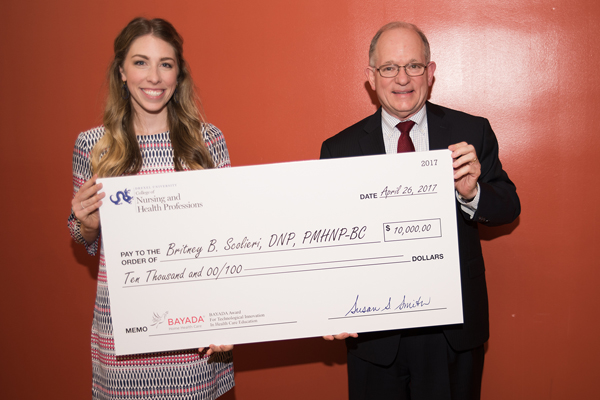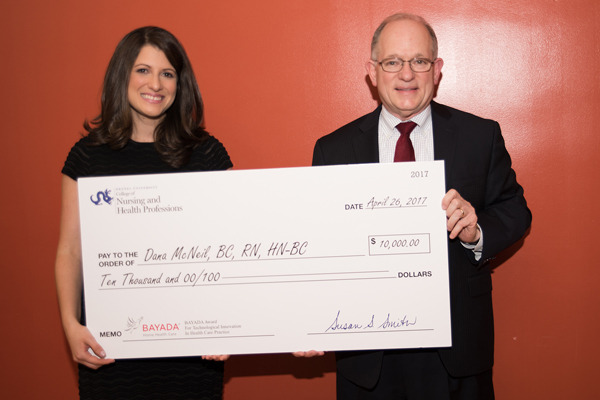Two Nurses Lock Up the 2017 BAYADA Award for Technological Innovation in Health Care Education and Practice
June 3, 2017
Since 2004, BAYADA Home Health Care and Drexel University College of Nursing and Health Professions (CNHP) have teamed up to celebrate and award technological innovation in health care education and practice. “It’s an honor to have a long-term partnership with Drexel’s College of Nursing and Health Professions,” said BAYADA Home Health Care Founder and President Mark Baiada. Since the inception of the BAYADA Award, $230,000 has been granted to 28 individuals or groups for projects that have made a difference in the educational outcomes of students and improved care for patients, something about which both the College and BAYADA are passionate. “We’re proud to empower these nurses whose innovative ideas can help shape the future of the health care landscape,” he added.
Previous winners include two individuals from Duke University School of Nursing for their innovative approach to build competencies among acute care nurse practitioner students mirroring real life encounters and promoting interdisciplinary teamwork through patient simulation, an associate professor of Clinical Medicine and Anesthesiology at University of Miami Miller School of Medicine for leading the way to the next generation of invasive bedside procedural instruction, a team from Duquesne University School of Nursing, Schar College of Nursing and Sciences at Ashland University and the University of Akron for establishing a virtual clinical experience to build cultural competence, a professor and Doctor of Nursing Practice coordinator at Georgia Baptist College of Nursing of Mercer University for developing an innovative, computerized risk assessment tool to determine the risk of deep vein thrombosis or pulmonary emboli in patients upon admission and during hospitalization and a nursing educator at the Eastern Center for Arts and Technology for introducing the use of intelligent pens as a technological tool to assist nursing faculty and their students.
This year’s winners are both nurses early in their careers; very fitting as we recently celebrated National Nurses Week. “The 2017 winners are young and it excites me because they are at the beginning of their careers,” explained Fran Cornelius, PhD, chair of Drexel’s BAYADA Award selection committee. “We are going to see remarkable things from the two individuals. They are changing healthcare,” she continued.
 Britney Scolieri, DNP, PMHNP-BC is an assistant professor in the Health and Community Systems (HCS) Department at the University of Pittsburgh School of Nursing. Befitting of her research focus, mental health care, nursing education and simulation, Scolieri received the BAYADA Award for Technological Innovation in Health Care Education for developing and launching an innovative educational app, PsychOut, to teach nursing students how to do a mental status assessment. “Following the recommendation of my mentor, Dr. Irene Kane, I did my own research on the BAYADA award,” she said. “The more I learned about the history of the award, past recipients, and all of the phenomenal projects that it has supported, the more I felt that the PyschOut project would be a perfect fit.” Scolieri’s app presents realistic, interactive clinical encounters that provide students an opportunity to apply what they’ve learned in a safe, controlled learning environment, strengthening students’ ability to conduct an effective psychiatric assessment. “Our goal with the PsychOut project was to not only to create a tool to improve education amongst the nursing population but to also promote and inspire other organizations to think outside the box when teaching complex subjects such as psychiatric nursing/medicine,” Scolieri explained. Using a variety of case-based, multimedia simulation scenarios that unfold realistically, students apply their knowledge and are able to immediately see the outcome of their approaches. Health professionals may encounter individuals with mental health issues in all practice settings underscoring the importance of providing opportunities to develop these essential skills. “The way students and professionals learn varies greatly from individual to individual, and we felt it was extremely important to provide the most realistic psych-based scenarios into a platform from which today's students feel most comfortable learning—technology,” she added. Scolieri is excited about the avenues the prestige and history of the BAYADA award will open for her to get the word out about her project and how it will affect student learning and patient outcomes.
Britney Scolieri, DNP, PMHNP-BC is an assistant professor in the Health and Community Systems (HCS) Department at the University of Pittsburgh School of Nursing. Befitting of her research focus, mental health care, nursing education and simulation, Scolieri received the BAYADA Award for Technological Innovation in Health Care Education for developing and launching an innovative educational app, PsychOut, to teach nursing students how to do a mental status assessment. “Following the recommendation of my mentor, Dr. Irene Kane, I did my own research on the BAYADA award,” she said. “The more I learned about the history of the award, past recipients, and all of the phenomenal projects that it has supported, the more I felt that the PyschOut project would be a perfect fit.” Scolieri’s app presents realistic, interactive clinical encounters that provide students an opportunity to apply what they’ve learned in a safe, controlled learning environment, strengthening students’ ability to conduct an effective psychiatric assessment. “Our goal with the PsychOut project was to not only to create a tool to improve education amongst the nursing population but to also promote and inspire other organizations to think outside the box when teaching complex subjects such as psychiatric nursing/medicine,” Scolieri explained. Using a variety of case-based, multimedia simulation scenarios that unfold realistically, students apply their knowledge and are able to immediately see the outcome of their approaches. Health professionals may encounter individuals with mental health issues in all practice settings underscoring the importance of providing opportunities to develop these essential skills. “The way students and professionals learn varies greatly from individual to individual, and we felt it was extremely important to provide the most realistic psych-based scenarios into a platform from which today's students feel most comfortable learning—technology,” she added. Scolieri is excited about the avenues the prestige and history of the BAYADA award will open for her to get the word out about her project and how it will affect student learning and patient outcomes.
Mentor, Drexel alumna and Cancer Treatment Centers of America’s CNO Joanne McGovern encouraged Dana McNeil, BSN, RN, HN-BC to submit an application for the award for a project that had been very successful in helping the nurses, and other members of the health care team, prevent/treat abnormal parameters quicker. McNeil is the recipient of the 2017 BAYADA Award for Innovation in Health Care Practice and the other $10,000 prize.  She designed and implemented an electronic board for early identification and rapid response to quickly assess patient status changes. The idea of the electronic board was first brought up by another one of her mentors and previous managers. “There were some fall outs on timely interventions, so a few of us came together to make the visual tool a reality, to not only help the nurses have quick access to the most pertinent data in the patient's chart but also to benefit the patients”, explained McNeil. Her board, displaying real-time patient acuity data in her in-patient oncology unit, has made a significant impact on the ability to rapidly identify and respond to patient deterioration, reduce risk for falls and injury as well as improve interdepartmental communication. The parameters displayed on the board include vital signs, Hendrich score and the Braden Scale and produces different color-coded alarms for each of the abnormal parameters, to quickly communicate urgency for assessment and intervention. The success of the innovation, since implementation in July 2015, led to timelier clinician interventions for 24 percent of patients and decreased falls by an impressive 60 percent.
She designed and implemented an electronic board for early identification and rapid response to quickly assess patient status changes. The idea of the electronic board was first brought up by another one of her mentors and previous managers. “There were some fall outs on timely interventions, so a few of us came together to make the visual tool a reality, to not only help the nurses have quick access to the most pertinent data in the patient's chart but also to benefit the patients”, explained McNeil. Her board, displaying real-time patient acuity data in her in-patient oncology unit, has made a significant impact on the ability to rapidly identify and respond to patient deterioration, reduce risk for falls and injury as well as improve interdepartmental communication. The parameters displayed on the board include vital signs, Hendrich score and the Braden Scale and produces different color-coded alarms for each of the abnormal parameters, to quickly communicate urgency for assessment and intervention. The success of the innovation, since implementation in July 2015, led to timelier clinician interventions for 24 percent of patients and decreased falls by an impressive 60 percent.
Applications are now being accepted for the 2018 awards and are due by March 1, 2018. “Every year we continue to be impressed by the quality of the applications received and we hope that next year’s applicants will continue that trend,” Cornelius articulated. The BAYADA Award is remarkable because its core intent is to shine the spotlight on healthcare professionals who are doing extraordinary and innovative things to improve health professions education and practice and yet are often unrecognized. “We are hoping to raise public awareness of this award because often the individuals, so deserving of this recognition, don’t realize the significance of their contribution and may need a nudge to submit an application. I urge anyone, who knows someone deserving of this recognition to encourage them to submit an application,” she added. Teams and individuals are encouraged to submit their projects for consideration and to share the information about the awards with their colleagues whose innovations are impacting the education of students and the lives of patients. Read about past winners and criterion for submission.
by Roberta S. Perry